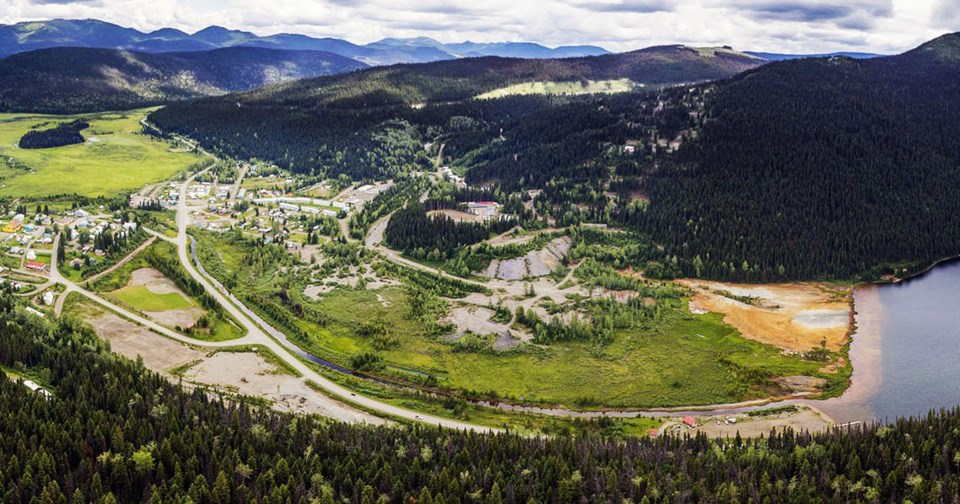Xatśūll First Nation is calling on the government of British Columbia and Osisko Development Corp. to halt the proposed Cariboo Gold Project, located southeast of Prince George, until their concerns are addressed and they grant consent.
“The province has shown it is failing to responsibly regulate this sector in our territory,” said Kukpi7 (Chief) Rhonda Phillips. “It’s not the 1980s anymore. By ignoring our very serious concerns about the Cariboo Gold Project, both the province and Osisko are neglecting their commitments to reconciliation and to upholding the rights of Indigenous peoples.”
Meanwhile, Osisko Development Corp. announced Thursday, Nov. 7 that the Mines Act permit for its Cariboo Gold Project has been referred for a decision to the statutory decision maker at the BC Ministry of Energy, Mines and Low Carbon Innovation.
The company also announced that the review of its Environmental Management Act permits has been completed, with those permits expected to be referred to the statutory decision maker in the near future. Osisko anticipates receiving final decisions on both permits in the fourth quarter of 2024.
The Cariboo Gold Project, which would be one of the largest gold mining operations in the region, lies within Xatśūll’s traditional territory.
Osisko states that the project covers an area of 192,000 hectares. The underground operation is expected to produce about 1.87 million ounces of gold over a 12-year mine life.
The project has been at the centre of a multi-year permitting process. In a statement, Osisko reiterated its commitment to advancing the project in partnership with Indigenous nations. This includes years of consultation and the signing of participation agreements with the Lhtako Dené Nation (2020) and the Williams Lake First Nation (2022).
Xatśūll First Nation is part of the larger Secwepemc Nation, located in the Cariboo region of British Columbia near Williams Lake.
While the company has yet to reach an agreement with the Xatśūll First Nation, it stated that it remains committed to ongoing engagement with the community, including following the issuance of any Mines Act or other permits.
“We have made good faith and reasonable efforts in the past two years to reach an agreement with Xatśūll First Nation, offering financial and other benefits similar to those agreed upon with other Indigenous communities,” said Sean Roosen, chair and CEO of Osisko Development. “Our focus has always been on ensuring that the Cariboo Gold Project is both beneficial and viable for all parties involved.”
Xatśūll leaders, including Phillips, argue that despite months of negotiations, there has been minimal progress in addressing their concerns. Phillips said the province and Osisko must engage in a genuine, consent-based decision-making process aligned with the principles of the Declaration on the Rights of Indigenous Peoples Act (DRIPA) and the United Nations Declaration on the Rights of Indigenous Peoples (UNDRIP).
The Xatśūll people call the proposed gold mine, located in the Wells-Barkerville area, a source of tension due to what they call its potential to harm local ecosystems and disrupt their cultural practices. Xatśūll’s concerns include the potential negative impact on the threatened Southern Mountain subspecies of the Barkerville Woodland Caribou herd, as well as broader cumulative environmental effects that could severely restrict the First Nation’s ability to practice traditional activities like hunting, fishing, and gathering medicinal plants.
Xatśūll has also raised alarms over the potential harm to human health and cultural well-being. The risk of exposure to contaminants through traditional foods and water, as well as the loss of access to cultural sites, could have long-term consequences for Xatśūll’s spiritual and social fabric, the release states.
The company reports that it addressed 1,700 comments during the environmental assessment review, and through multiple rounds of consultations with the Mine Review Committee, responded to over 1,800 additional comments as part of the permit application process.
Despite Xatśūll withholding its consent for the project, the provincial government issued an environmental assessment certificate for the project in October 2023. Phillips said the failure to meaningfully address Xatśūll’s concerns after more than a year of discussions signals a disregard for Indigenous rights.
Roosen expressed confidence that the provincial government would uphold its responsibilities in the decision-making process, and reiterated the company’s intention to continue engaging with the Xatśūll First Nation, particularly in sharing the socio-economic benefits of the project.
"Consultation on this project has been robust and thorough, and we are confident that our record reflects our commitment to meeting our obligations. We look forward to continuing to work with all stakeholders, including Xatśūll First Nation, to ensure a meaningful and sustainable outcome," he said.
“We emphasize that Xatśūll would like to see sustainable resource development in our territory, but it’s remarkable that in 2024 the province and Osisko continue to push ahead with this mine without our consent,” she said. “If permitting moves forward without addressing our concerns, any permits issued will be highly vulnerable to legal challenges.”
In addition to its ongoing negotiations with Osisko, Xatśūll is calling on the provincial government to prioritize a collaborative process that would resolve outstanding issues before the Cariboo Gold Project proceeds. The First Nation has warned that without such a process, the project could face significant legal risks, especially in light of the Supreme Court of Canada's ruling in the Tsilhqot’in case, which found that projects initiated without Indigenous consent could be required to cancel if they unjustifiably infringe on Aboriginal title.
Xatśūll is also considering a legal challenge based on cumulative industrial impacts, similar to the successful case brought by the Blueberry River First Nations, which challenged the province over cumulative effects from industrial development in their territory.
“We will not stand down until we are treated respectfully as partners and acknowledged as Aboriginal title holders and decision-makers,” Phillips said.



